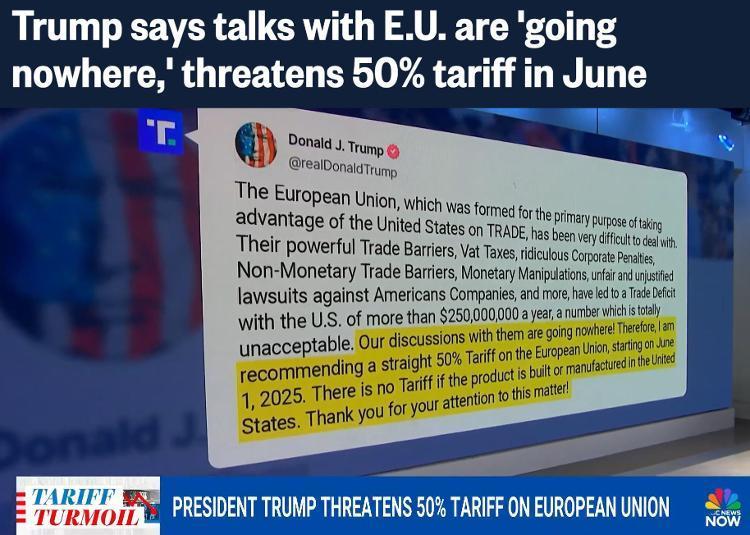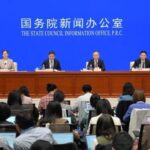On the 23rd, U.S. President Trump expressed strong words on social media, suggesting a 50% tariff on EU goods starting June 1st, due to “no progress” in talks between the U.S. and the EU.
He reiterated a long-held view: if goods are made in the U.S., no tariffs are needed.
△ Screenshot from American National Broadcasting Company
According to insiders, negotiations between the U.S. and the EU have stalled, with the U.S. demanding unilateral concessions to open European markets to American businesses, while the EU seeks a mutually beneficial agreement.
In response to the latest threats, EU Commissioner for Trade and Economic Security stated that any trade agreement must be based on mutual respect, not threats.
△ Screenshot from UK’s The Guardian
“Tariffs are accelerating the U.S.’ decoupling from the world.”
German Foreign Minister stated that the U.S. threats to heighten tariffs against European products benefit no one, and Germany will continue to support dialogues between the EU and the U.S.
“The EU Commission is committed to securing market access rights for member states into U.S. markets. Tariff measures are disadvantageous for everyone and only negatively impact the development of the two major economies, the EU and the U.S.”
△ Screenshot from Deutsche Presse-Agentur (DPA)
French Minister in charge of foreign trade emphasized the necessity for the EU to “show countermeasure strategy” to establish a real “power balance” in upcoming negotiations.
On the same 23rd, Trump also threatened that all Apple phones manufactured overseas and sold in the U.S. would face tariffs of up to 25%. Samsung Electronics and other smartphone makers would also confront U.S. tariffs. Related policies are expected to begin by the end of June.
Impacting the U.S. stock market, the three major indices in New York fell simultaneously on that day.
△ Screenshot from Pengpai News
Analysts widely believe shifting the entire supply chain of Apple Inc. to the U.S. is an “impossible task.” Even if realized, it would significantly increase the cost of goods, deeply impacting investors and tech stock valuations.
U.S. asset management company Wedbush Securities analyst openly stated that manufacturing Apple phones in the U.S. is “just a fairy tale and is unlikely to happen in practical life.”
△ Interview with American Consumer News and Business Channel
Senior researcher at America’s Peterson Institute for International Economics believes Trump’s statements are part of the U.S. government’s negotiation strategy, which may not be genuinely implemented; however, in the long run, this definitely is a self-damaging move.
“This shows the U.S. is an unreliable trading partner, operating on impulse rather than the rule of law. Whether friends or foes of America, none receive friendly treatment. Therefore, would the U.S. government ideally look forward to more investments from its trading partners? The answer is undoubtedly negative.”
△ File photo
Former U.S. Treasury Secretary believes the U.S. government’s reckless tariff policies will harm investor confidence in U.S. assets and ultimately severely damage the U.S. economy.
“Lack of trust in financial markets means higher borrowing costs, indicating a devaluation over time of the U.S. dollar, requiring us to pay more for imported goods. With U.S. government debt continuously rising and foreign investors holding large quantities of U.S. debt, U.S. government tariffs accelerate the U.S.’ decoupling from other countries, which is a very wrong strategy.”
△ File photo
“The two parties in the U.S. have poor records in this area.”
The U.S. government’s inconsistent tariff policies not only leave involved countries unable to react in time, but also cause global stock markets to resemble “roller coasters,” leading to heavy losses for numerous ordinary investors.
However, at the same time, some American politicians are suspected of seizing the opportunity for insider trading and making substantial profits.
Recently, a news investigation website found, after reviewing hundreds of trading disclosure reports, that since the current U.S. government took office in January, dozens of U.S. government senior officials, congressional staffers, and even congress members engaged in perfectly timed transactions, with most selling stocks before market crashes caused by U.S. tariff policies; some made timely purchases of stocks in companies benefiting from relevant lawsuits.
Confronted with doubts, these individuals either denied inside information access or refused to comment.
△ Report screenshot</p


